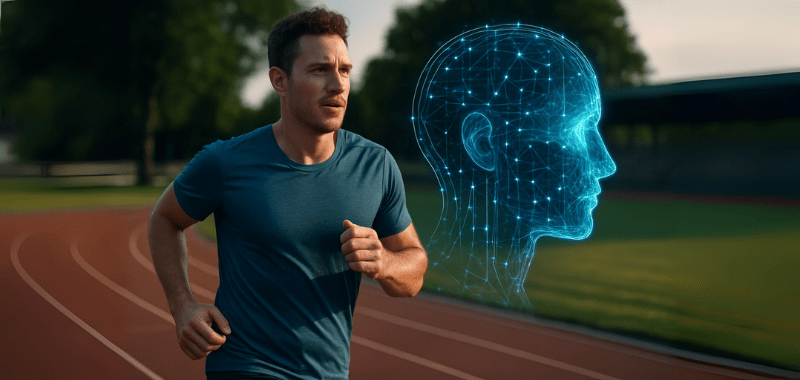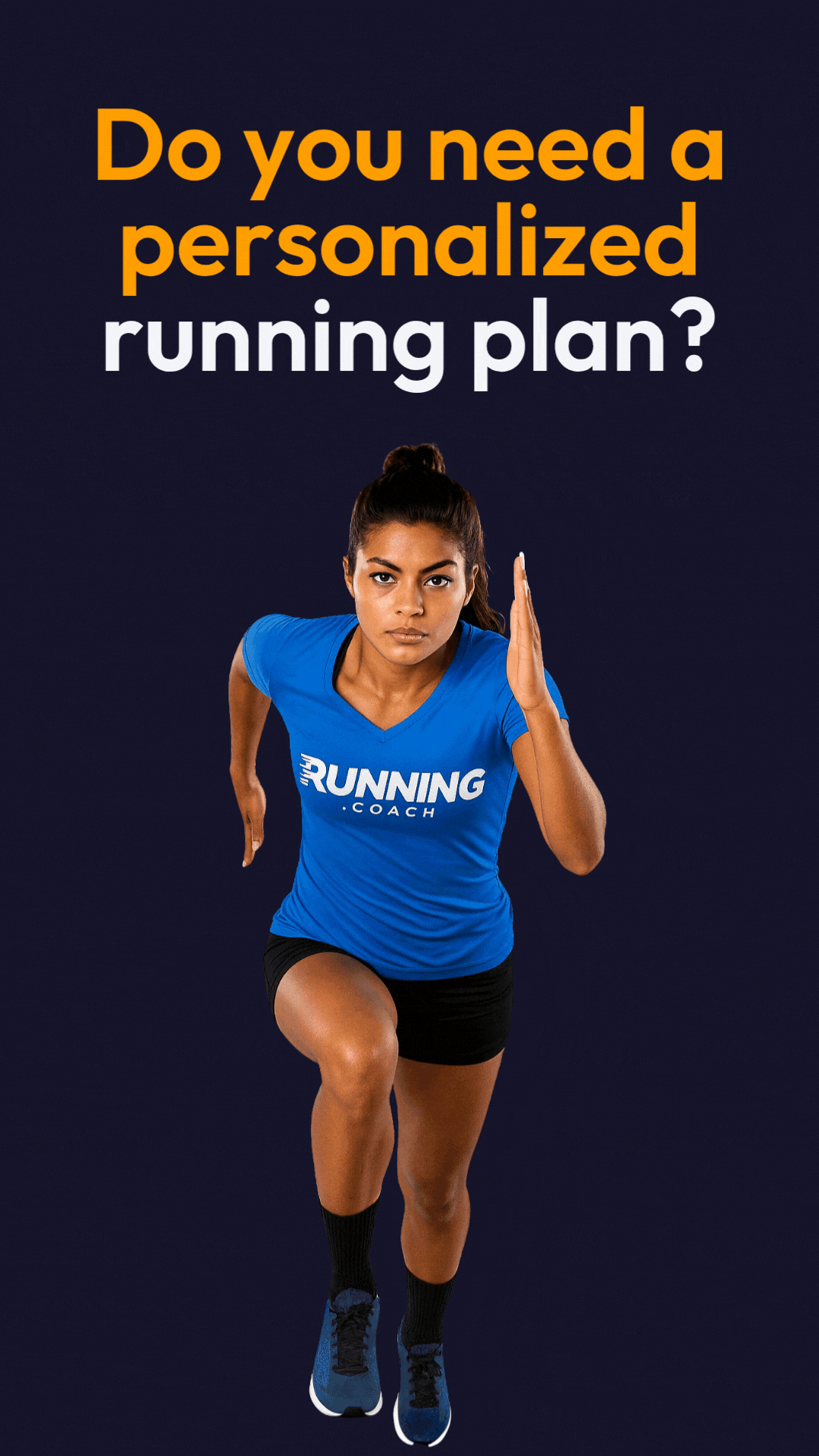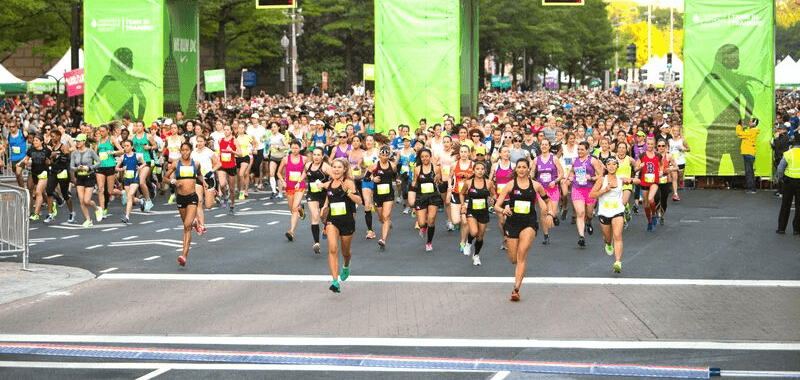Tabla de contenido
Artificial Intelligence (AI) is transforming the way runners plan, execute, and evaluate their training. This guide delves into the practical uses, opportunities, and limitations of AI applied to running, also drawing insights from a recent comparative study between a human coach and ChatGPT.
Today, various AI-powered tools support runners through complementary approaches. Specialized platforms like running.COACH offer structured and adaptive plans that combine smart algorithms with real physiological data (pace, heart rate, training load, elevation). These platforms automatically adjust training plans based on your progress, feedback, and race schedule. They also incorporate key metrics such as effort zones, fatigue monitoring, mileage per shoe, and personalized rehab plans in case of injury or disruptions.
Conversational systems like ChatGPT, on the other hand, can generate training plans from written instructions, allowing runners to explore ideas and training variations with great flexibility. Although both models are AI-based, their levels of personalization, monitoring, and technical depth differ significantly.
One example that highlights this potential is Swiss athlete Matthias Kyburz, an eight-time world champion in orienteering, who achieved the Olympic qualifying time in his marathon debut (2:08:10 in Paris 2024). He adapted his training using the running.COACH algorithm, guided by former marathoner Viktor Röthlin. In just four months, AI helped him build an efficient, specific, and injury-free progression—demonstrating the effectiveness of smart planning even at the highest competitive level.
Exclusive interview: Matthias Kyburz
This case not only sets a precedent as the first Olympic marathoner trained with artificial intelligence, but also demonstrates how a well-designed platform can go beyond generic models to offer technical coaching, individualized monitoring, and dynamic adjustments based on physiological response and final goals.
AI is already an integral part of modern training. Its ability to process large volumes of data enables dynamic adjustments to training plans, predicts injury risks, and provides real-time recommendations.
- Continuous performance optimization
- Proactive injury prevention
- Rapid adaptation to routine changes or fatigue
As expected, an AI chatbot won’t replace a running coach anytime soon, but it can already offer a solid starting point for our journey as runners, helping us reflect on the many aspects we need to consider when we take running seriously.
Generative artificial intelligence is incredibly useful and has the potential to transform how we access information. The technology is impressive—but it’s important to remember it’s still in its early stages.
Despite its primitive state, AI can guide us in the right direction when we need to build a training plan and help identify the many factors we should take into account. A small experiment with an AI-generated 10K training plan proves this point. However, there are key considerations to keep in mind.

1. How to write a proper and specific prompt for running
A good prompt to generate a training plan must be clear, specific, and complete. The more detailed the information you provide, the more accurate and useful the result will be. Here are the key elements it should include:
1. Clear goal
State what you want to achieve:
- “I want to run a 10K in under 50 minutes.”
- “I’m looking to finish my first marathon.”
- “I want to improve my 5K time.”
2. Current level and experience
Describe your current situation:
- Are you a beginner, intermediate, or advanced runner?
- How many times a week do you run, and how many kilometers or miles?
- Do you have a recent personal best for any distance?
Example:
I run 4 times a week, averaging 30 km per week. My 10K personal best is 52 minutes.
3. Time availability for training
How many days a week can you train? Do you have scheduling restrictions or specific available days?
4. Goal date or timeline
Mention if you have a specific race coming up or a timeframe for your goal:
“The race is in 10 weeks.” / “I want to achieve this in 3 months.”
5. Preferred training style: pace, heart rate, or effort
You can request that the plan be based on:
- Pacing (min/km or min/mile)
- Heart rate zones
- Effort duration (minutes per session)
- Rate of perceived exertion (RPE scale)
6. Special conditions (optional)
Include additional relevant info:
- Age, recent injuries, or physical limitations
- If you do cross-training (cycling, gym, swimming)
- If you have a coach, access to a track, treadmill, or only run outdoors
Example of a well-structured prompt
I’m an intermediate runner. I run 4 times per week, averaging about 30 km. My best time in the 5K is 24:30. I have a 10K race in 8 weeks and want to run it in under 50 minutes. I can train 4 days per week, including weekends. I’d like a heart rate–based plan that includes some strength and technique work. Can you create a personalized plan?
You can also take an existing structured plan—like those published on our website—and ask it to be adapted to your personal conditions.
The more information you provide, the better the result.
How accurate and useful is ChatGPT for creating a running training plan?
A good training plan must be based on core principles:
- Progressive overload, which allows the body to adapt without increasing the risk of injury.
- Specificity, meaning you should train under conditions similar to your race to improve performance.
- Individuality, since everyone responds differently to physical stress and needs plans tailored to their capacity.
It’s also essential to consider:
- The law of diminishing returns, where the fitter you are, the harder it becomes to keep improving.
- Reversibility, which reminds us that gains are lost when training is interrupted—consistency is key to maintaining progress.
10-Week Training Plan for New Runners Can you rely on an existing plan and AI?

What do users say?
- User reviews indicate that plans generated by ChatGPT tend to be generic and, without expert supervision, often fall short compared to proven programs like Garmin Coach or running.COACH.
- Conceptual errors have been observed: the model may misinterpret metrics (e.g., VO₂ max or cadence) and even fabricate data, which poses a risk if the information isn’t verified.
- ChatGPT is useful for specific ideas or isolated workouts, provided the runner has the judgment to assess the quality of the response and formulate precise prompts.
- There are specialized AI platforms (TrainAsONE, AI Endurance) that integrate real data from Garmin/Strava and adjust plans more rigorously; even so, users report the need to review “inconsistent” sessions and apply common sense.
Source: thread “ChatGPT for running?” on r/running (https://www.reddit.com/r/running/comments/1alww45/chatgpt_for_running/)
- Detailed plan: I received a daily training and nutrition program all the way to race day.
- Ongoing adjustments: I sent frequent updates, and the AI coach adjusted the plan when necessary.
- Two-way communication: I asked questions (some insightful, others simple) and shared feelings and doubts to get contextualized responses.
- Multichannel: I communicated via voice and chat, establishing a rhythm of interaction with the coach.
- Disciplined execution: I trained and followed most of the instructions I received.
AI is a powerful ally for planning and adjusting your running training. Its best performance emerges when combined with human judgment—whether yours or that of an expert coach—and the support of a community. Use technology for numbers and patterns; trust experience and intuition for critical decisions.
| Training Principle | User Comment | Relation |
|---|---|---|
| Progressive overload | Disciplined execution: I trained and followed most of the instructions I received. | Reflects the importance of following a structured and progressive load to achieve adaptations without overtraining. |
| Specificity | Detailed plan: I received a daily training and nutrition program all the way to race day. | A specific and personalized plan that considers all performance aspects, including nutrition and key dates. |
| Individuality | Ongoing adjustments: I sent frequent updates, and the AI coach adjusted the plan when necessary. | Shows how a good system adapts training to the individual’s response and progress. |
| Diminishing returns | ChatGPT is useful for specific ideas… as long as the runner has sound judgment. | At intermediate or advanced levels, improvements require more precision, which limits the value of generic tools. |
| Reversibility | Disciplined execution (implied) and Two-way communication: I shared feelings and doubts… | Consistency (discipline) and emotional support help avoid performance setbacks due to loss of motivation or dropping out of the plan. |
| General model limitations (risks) | Plans generated by ChatGPT tend to be generic… it may misinterpret metrics or make up data. | Highlights the lack of precision or individualized monitoring, which contradicts the principles of progression, individuality, and specificity. |
| Comparison with more robust systems | There are specialized AI platforms… but they require manual review of sessions. | Despite being more advanced, these platforms still need human oversight to ensure specificity, progression, and individual adaptation. |
Lessons from the “Coach vs AI” Study
In the podcast “Expert/Pro Run Coach vs AI ChatGPT: Who’s Better?” (Daren DLake × Mike Trees), coaching advice was compared with training plans generated by ChatGPT for two real-life cases. Below are the full examples and key takeaways.
Practical Example 1: A 22-year-old sprinter looking to debut in the half marathon
| Aspect | Coach Mike Trees | ChatGPT |
|---|---|---|
| Initial assessment | Strong in short distances; lacks aerobic base. Recommends postponing the half marathon by 12 months and building up with 5K/10K first. | Suggests running a half marathon in 6 months after 6–8 weeks of base + 8–10 weeks of specific training. |
| Weekly volume | Very gradual progression (<10%); focus on recovery to avoid injuries. | 4–5 sessions/week with long runs increasing up to 21 km; no monitoring of individual fatigue. |
| Quality work | Long intervals, fartlek, and strides to maintain speed; prioritizes aerobic development. | Short intervals (4×400 m, 200 m) focused more on speed than on the endurance needed for 21K. |
| Habits & recovery | Emphasis on ≥8 h of sleep, proper nutrition, and limiting alcohol. | Standard advice: 7 h of sleep, max 2 alcoholic drinks per week. |
Balance: ChatGPT gets the “base + specific” structure right, but underestimates the need for a longer aerobic base and provides generic details.
Practical Example 2: 50-year-old female runner (4h 20min in marathon) aiming to break 4 hours.
| Aspect | Coach Mike Trees | ChatGPT |
|---|---|---|
| Initial assessment | Ambitious goal given injuries and stress. Prioritizes 6 weeks of strength and habit-building before increasing volume. | Suggests 6–8 weeks of base + 12–16 weeks of specific training; does not address sleep issues or hamstring injuries. |
| Strength plan | 3 sessions/week of 45 minutes at the beginning; then 2 maintenance sessions/week. | Mentions “strength/yoga 1–2 times” with no details on progression. |
| Volume and intensity | Cautious increase; target-pace intervals grow from 5 → 10 → 15 → 20 km; health and longevity prioritized over finish time. | Standard weekly plan (4 runs, 1 tempo, 1 long run); no adaptation to fatigue or personal context. |
Balance: AI provides a logical structure but overlooks limiting factors (injuries, stress, sleep quality). The human coach offers a holistic and realistic approach.
General Lessons
AI-generated plans are useful but generic: they offer coherent training structures, but lack deep individual nuance.
Lack of human context: AI does not incorporate emotional factors, lifestyle, or injury history unless explicitly stated. The social aspect remains key—algorithms cannot replace camaraderie, mutual motivation, or the shared experience provided by a running community.
Value of the human coach: able to interpret body signals, adjust goals, and provide motivation and empathy.
Ideal synergy: AI automates data analysis; the coach focuses on complex decision-making and personalized support.
In summary: AI is a great tool, but not a replacement for human judgment or individual guidance. Use it to plan, analyze, and adapt—but remember that real progress comes from the body, the mind… and the runner’s heart.
Source: https://dlakecreates.com/expertpro-run-coach-vs-ai-chatgpt-w
Three tips for those trying AI-guided training
- Don’t be afraid of AI
There’s a lot of hype around artificial intelligence, but making training decisions similar to those of an experienced coach is exactly the kind of task where AI excels. - Be selective
Not all endurance training apps that claim to use AI are well designed—and some don’t even use real AI. Do your research and compare before choosing the one you’ll rely on. - Don’t overestimate AI’s power
A well-designed app can give you solid workouts, but reaching your full potential involves much more. Human coaches remain better at guiding key aspects like race strategy, emotional management, and balancing sport with life. That said, coaching may be costly or unavailable to many recreational runners.
Artificial intelligence is here to stay, and in the running world, it’s no longer just a tech curiosity. It’s a powerful tool with enormous potential. It can structure plans, analyze data, and offer instant feedback. But its greatest strength—automation—is also its greatest limitation. It lacks a human touch. It doesn’t recognize the exhaustion behind a bad session, can’t read a frustrated look, and won’t adjust the plan because your child was sick all night.
Runners who manage to integrate AI into their routine without fully outsourcing their judgment will find a strategic balance. Because running—like learning or living—is not just about logic. It’s about consistency, context, and emotion.
That’s the point of ideal synergy—not to replace, but to complement. Let AI do what it does best: numbers, structure, and consistency. And let you—coach or not—make the decisions that truly matter. That combination, when well executed, can take you farther than you ever imagined.

Looking for a plan that trains with you, not against you?
At running.COACH, we don’t just build a schedule. We create a smart, living plan that evolves with you. It understands your level, your race goals and your real life. Whether you sync your GPS watch or train straight from our iOS or Android app, your plan adjusts automatically as you improve.
From day one, you’ll feel the difference:
- A fully personalized, dynamic plan designed for you.
- Automatic sync and effortless workout tracking.
- Real-time updates when life happens, including missed sessions, new races or schedule changes.
- Simple, science-backed guidance to train smarter and recover faster.
🎁 Start today and enjoy your first 30 days free.
Because the best training plan isn’t one you follow. It’s one that follows you.app.











0 Comments